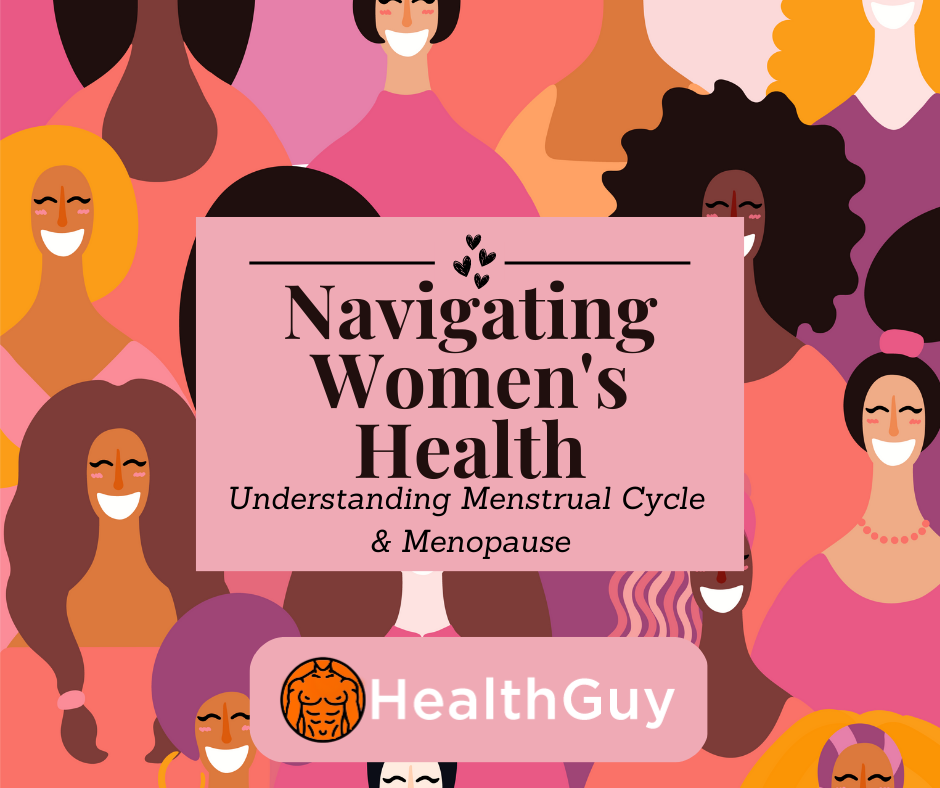
Navigating Women’s Health: Understanding Menstrual Cycles and Menopause
Women’s health is a complex and constantly evolving field that requires attention, care, and awareness. Two of the most important aspects of women’s health are menstrual cycles and menopause, which are natural processes that occur in women throughout their lives. In this article, we will explore these two processes in detail and provide information on how to manage them effectively.
Menstruation is a natural process that occurs in females of reproductive age. It is a monthly cycle that prepares the body for pregnancy. The menstrual cycle is controlled by hormones, and it usually lasts for 28 days, although it can vary from 21 to 35 days. The menstrual cycle consists of three phases: the follicular phase, ovulation, and the luteal phase.
The follicular phase is the first phase of the menstrual cycle, which starts on the first day of menstruation and lasts for about 14 days. During this phase, the follicles in the ovaries begin to mature, and the lining of the uterus starts to thicken in preparation for a potential pregnancy.
Ovulation is the second phase of the menstrual cycle, which usually occurs around day 14. During ovulation, an egg is released from one of the ovaries and travels down the fallopian tube. This is the most fertile time of the menstrual cycle, and if sperm is present in the fallopian tube, fertilization can occur.
The luteal phase is the third and final phase of the menstrual cycle, which starts after ovulation and lasts for about 14 days. During this phase, the follicle that released the egg turns into a structure called the corpus luteum, which produces progesterone. Progesterone helps to prepare the uterus for pregnancy, and if fertilization does not occur, the corpus luteum breaks down, and the lining of the uterus is shed during menstruation.
Managing Menstrual Cycle
Managing the menstrual cycle can be challenging, but there are several ways to do it effectively. Here are some tips for managing the menstrual cycle:
- Use menstrual products: There are several menstrual products available, including pads, tampons, menstrual cups, and period panties. It is important to choose a product that is comfortable and easy to use.
- Pain relief: Many women experience cramps and other discomforts during their menstrual cycle. Over-the-counter pain relief medications such as ibuprofen can help to relieve pain.
- Exercise: Regular exercise can help to alleviate menstrual cramps and other symptoms. It is important to engage in physical activity regularly, but not excessively.
- Diet: A healthy diet that is rich in fruits, vegetables, and whole grains can help to reduce menstrual symptoms. It is important to limit the intake of sugar, salt, and caffeine during the menstrual cycle.
- Rest: It is important to get enough rest during the menstrual cycle. Adequate sleep and rest can help to alleviate menstrual symptoms and promote overall health.
Menopause
Menopause is a natural process that occurs in women between the ages of 45 and 55. It is the end of reproductive life and marks the cessation of menstruation. Menopause occurs when the ovaries stop producing eggs and the levels of estrogen and progesterone decline.
Symptoms of Menopause
The symptoms of menopause can vary from woman to woman, but common symptoms include:
- Hot flashes: Hot flashes are sudden sensations of warmth or heat that can last from a few seconds to several minutes. They can be accompanied by sweating and flushing.
- Night sweats: Night sweats are similar to hot flashes, but they occur during sleep and can cause intense sweating.
- Vaginal dryness: Menopause can cause a decrease in the production of vaginal lubrication, leading to vaginal dryness and discomfort during intercourse.
- Mood changes: Menopause can cause mood changes, such as irritability, depression, and anxiety.
- Sleep disturbances: Menopause can cause sleep disturbances, such as insomnia and restless sleep.
Managing Menopause
Managing menopause can be challenging, but there are several ways to do it effectively. Here are some tips for managing menopause:
- Hormone replacement therapy: Hormone replacement therapy (HRT) is a common treatment for menopause. It involves taking estrogen and progesterone supplements to replace the hormones that the body is no longer producing.
- Lifestyle changes: Making lifestyle changes can help to manage menopause symptoms. Eating a healthy diet, exercising regularly, and reducing stress can help to alleviate symptoms.
- Alternative therapies: Alternative therapies, such as acupuncture, yoga, and meditation, can help to manage menopause symptoms. These therapies can help to reduce stress and improve overall well-being.
- Medications: Certain medications, such as antidepressants and blood pressure medications, can help to manage menopause symptoms.
- Vaginal lubricants: Vaginal lubricants can help to alleviate vaginal dryness and discomfort during intercourse.
In addition to these tips, it is important to seek medical advice if menopause symptoms are severe or affecting daily life. A healthcare provider can provide guidance on the best course of treatment and offer support during this transition.
Conclusion
In conclusion, understanding and managing women’s health issues such as menstrual cycles and menopause is crucial for maintaining overall health and well-being. Women should be aware of the natural processes and changes that occur in their bodies and seek medical advice if necessary. By making healthy lifestyle choices, managing symptoms, and seeking medical advice when needed, women can navigate through these phases of their lives with ease and enjoy optimal health and well-being. It is also important for society as a whole to be aware and supportive of women’s health issues and to work towards creating a more inclusive and understanding environment for women.
